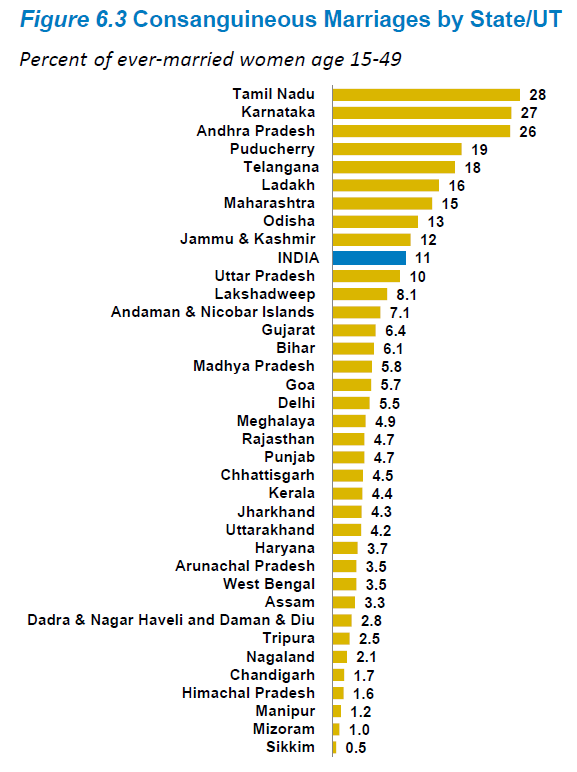Lysosomal Storage Disorders Support Society
Breaking the Cycle: The Need for Awareness on the Ill Effects of Consanguinity in India
February 26, 2023 | LSDSS
Consanguinity, or marriage between blood relatives such as first cousins, second cousins, or closer relatives, has been a longstanding practice in some regions of India. While it may be culturally acceptable in some regions, it has been scientifically proven to increase the risk of genetic disorders in newborns. In this blog post, we will delve deeper into the prevalence of consanguineous marriages in India, the social reasons behind it, and the scientific evidence that supports the need for awareness.
Prevalence of Consanguineous Marriages in India
Consanguineous marriages are more prevalent in India than in many other countries due to cultural, religious, and social practices. According to the latest National Family Health Survey-5 (NFHS-5), 11% of marriages in India are consanguineous. Consanguineous marriages are especially high in the southern states/UTs of Tamil Nadu, Puducherry, Andhra Pradesh, Telangana, and Karnataka, where the prevalence is as high as 28%. This implies that almost 1 in 4 women in these states is married to a blood relative such as a first cousin or second cousin.

Source: National Family Health Survey (NFHS) – 5, Ministry of Health & Family Welfare, Government of India
Estimates show that almost 40%-50% of patients visiting the Centers of Excellence for rare diseases in India with a genetic problem have a history of consanguineous marriages in their families. This highlights the need for awareness and immediate action to reduce the burden of genetic disorders in India, especially considering the challenges in accessing the high-cost treatment of many of these disorders in India.
Social Reasons Behind Consanguineous Marriages
In India, consanguineous marriages are often preferred due to various social reasons. For instance, marriages within the same caste or community are considered desirable, and this often leads to marriage between close relatives. Additionally, parents may view consanguineous marriage as a way to preserve family wealth, maintain property ownership, or ensure a stable family structure.
Scientific Evidence
Several scientific studies have shown that consanguineous marriages can significantly increase the likelihood of genetic disorders in newborns. For instance, “Consanguinity and Its Sociodemographic Correlates in South India” by Nalini et al. (2018) found that the prevalence of consanguinity was significantly higher among families with a history of genetic disorders, such as thalassemia and sickle cell anemia. Another study “Lysosomal storage disorders in a consanguineous population in Saudi Arabia” by Al-Jasmi et al. (2013) found that consanguinity was a significant risk factor for lysosomal storage disorders (LSDs), such as Gaucher disease and Fabry disease, in a Saudi Arabian population.
A study “Prevalence and pattern of consanguinity and its correlates in Anantapur district of Andhra Pradesh, India” by Ramachandra et al. (2016) found that consanguinity was associated with a higher prevalence of genetic disorders, including hemoglobinopathies and chromosomal abnormalities. Another study “Consanguineous marriage and congenital heart defects: A case-control study in the neonatal period” by Akhtar et al. (2019) found that consanguinity was significantly associated with an increased risk of congenital heart defects in newborns.
Steps to Raise Awareness
Raising awareness about the ill effects of consanguineous marriages is crucial to prevent the burden of genetic disorders like LSDs. It is important to educate the public about the risks associated with consanguineous marriages and to promote the adoption of healthy practices like premarital counseling and genetic testing. Additionally, healthcare providers should be trained to identify and manage patients with genetic disorders, and counseling services should be made available to individuals and families affected by such disorders.
Conclusion
Consanguineous marriages may be a deeply ingrained cultural practice in some parts of India, but it is essential to recognize the risks associated with such marriages. The prevalence of genetic disorders in families with a history of consanguinity highlights the urgent need for awareness and action. Through education and counseling, we can help break the cycle of consanguinity and ensure that all children have the opportunity to live healthy, fulfilling lives.
